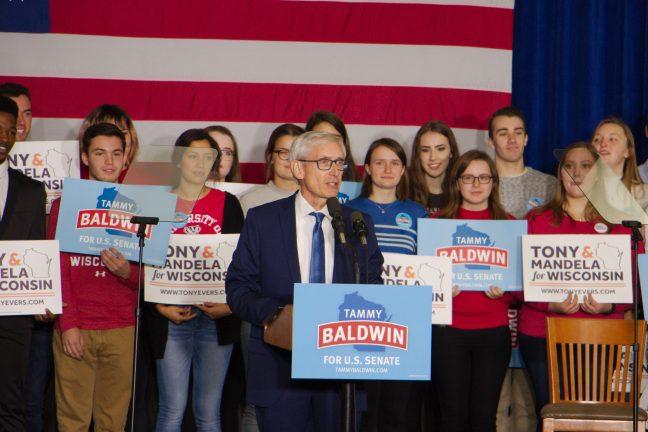Entering the gubernatorial election, Gov. Tony Evers (D) announced a $90 million allocation into K-12 education for mental health services, staffing needs and classroom support.
Of the allocation, $15 million will support the “Get Kids Ahead” initiative, which is intended to build comprehensive school mental health systems.
“Whether it’s making sure kids have access to mental health services, helping with increased costs of classroom and school supplies due to national inflation, or retaining and recruiting educators and staff to keep class sizes small, these investments will go toward making sure our kids have the resources and support to get caught up and be successful both in and out of the classroom,” Evers said in a press release.
Scott Phillips, a U.S. history teacher in Whitewater, Wisconsin, said a plan for mental health support was necessary when returning to in-person instruction after the COVID-19 pandemic.
According to the Annie E. Casey Foundation, 26% more school-aged children had anxiety or depression in the United States in 2020 than 2016.
These mental health impacts coincide with the pandemic and rising concerns about violence in schools. They don’t impact all students equally — according to Kids Forward, 60% of Indigenous children, 26% of Black children and 22% of Latinx children in Wisconsin were reported to have anxiety or depression. Fifteen percent of white children reported the same symptoms.
Phillips hopes Evers’ funding will support students who are struggling after a return to in-person instruction.
“There just apparently seems to be a lot of data out there about teens who are struggling with anxiety, and then you throw COVID on top of that,” Phillips said. “I hope this money’s going to make a difference in terms of having support for those teens that need it, whatever that is … resources, training [or] bringing more staff in.”
Schools that were eligible to receive funding will be able to create comprehensive school mental health systems. These systems are intended to support student and staff mental health through several pathways — school mental health teams, crisis support, mentoring and peer-to-peer suicide prevention are just a few of these strategies.
The plan includes mental health resources for teachers, too — Phillips said these resources are important for educators after the pandemic.
“So many of us [teachers] were a mess when we came back from COVID,” Phillips said.
With the approaching election, Phillips said it’s a treacherous time to be teaching high school. He worries about remaining neutral on political topics or saying something that is misinterpreted as partisan in the classroom.
But it’s an exciting time for Phillips, too — students are more involved in classroom discussions because they are more politically engaged, and he is excited about the election’s large implications on both state and federal levels.
Professor emeritus from the Political Science Department at the University of Wisconsin La Follette School of Affairs John Witte said that while the election was probably a factor in Evers’ allocation, his support of education is no surprise.
Witte said the money allocated to mental health funds was partly a reaction to violence in schools.
“I think that’s a reaction to the terrible things that have happened in schools, shootings and the violence that’s happened,” Witte said. “…That’s for a relatively new category of things and I’m sure it’s a direct reaction to violence in the schools in the last couple years.”
Tim Michels, Evers’ Republican opponent, disagrees with the level of spending on education resources. According to the Milwaukee Journal Sentinel, Michels said Evers’ $90 million allocation was a political plan and that spending more money on schools is unnecessary.
Michels also stated that Evers’ education policies are anti-parent and pro-special interest, and that they don’t resonate with voters in Wisconsin. In a debate, Michels said more investments in education are not helping future generations.
“There’s no greater investment than the future generations of Wisconsin. The problem there is we’re already throwing so much money at education,” Michels said during the debate. “That’s been the fix, if you will, for the last 10, or 20, or 30 years, more money on education, more money on education, and it’s not working — the definition of insanity.”
Michels and Evers have different education policy strategies, Witte said. Main focuses of the gubernatorial race surrounding education are on issues of school choice and teachers’ unions.
Despite rising cases of poor mental health in K-12 students, it is not a widely contested topic. Phillips said because mental health resources are not as polarizing, they aren’t talked about as much as they should be.
“I don’t hear nearly enough about mental health. I don’t hear them talking about it enough. We talk about the issues that polarize us and are going to motivate people to have a strong emotional reaction, get us to the polls,” Phillips said. “…Do you think we’ll hear a question asked in the senator’s race or the governor’s race debate about mental health?”


